-
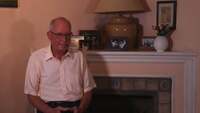 Interview with Bob Wittman
Interview with Bob Wittman Bob Wittman discusses his life as an LGBT individual and how he came to be involved in LGBT activism.
-
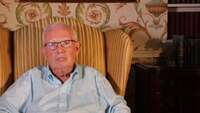 Interview with Frank Whelan
Interview with Frank Whelan Frank Whelan discusses his life as an LGBT individual and how he came to be involved in LGBT activism.
-
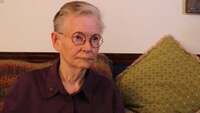 Interview with Patricia Sullivan
Interview with Patricia Sullivan Patricia Sullivan discusses her life as an LGBT individual and how she came to be involved in LGBT activism.
-
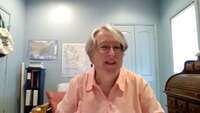 Interview with Michele Strohl
Interview with Michele Strohl Michele Strohl describes her childhood in Northeastern PA with a focus on family life, discussion of normative understandings of gender, and her school experiences. Strohl describes college life at East Stroudsburg University, the lesbian community at college, and her first jobs as a mental health worker in Wilkes-Barre and then Allentown. Strohl goes on to explore getting a graduate degree in Psychology and her work in this field. In terms of the LGBT community, Strohl discusses a variety of organizations, including PA-GALA, AIDS Outreach, Gay and Lesbian Task Force, GLORA, and GLOS. She also provides information about local LGBT bars and nightlife as well as moving accounts of the early years of the AIDS epidemic and the impact of marriage equality on her personally. Finally, she discusses her marriage to Jane Land with details about their marriage ceremony and life together.
-
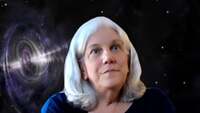 Interview with Sandy Mesics
Interview with Sandy Mesics Sandy Mesics describes her childhood, growing up in Bethlehem, PA; her reflections on Bethlehem Steel, including her father’s employment with the company and working-class steel communities; and her experiences as young transwoman trying to find information in tabloids and books about other transgender people. She discusses her enrollment at Penn State as a physics and later a psychology major; her anti-Vietnam war activism; her gender dysphoria during college; and her journey toward gender affirmation with support from the Erickson Foundation and a doctor in Philadelphia. Moving to Philadelphia after college because of the large LGBTQ community, Sandy started Image Magazine, worked with Transsexual Action Committee, the Radical Queens, and Eromin Center; in addition, she built a relationship with publishers of Female impersonator Magazine and ultimately worked with publishers to produce articles and publications for transgender readers, beginning 1974-1975. Sandy then describes using her work in publishing to gain employment with W.B. Saunders, a graphic arts company, and as an html coder. Toward the end of the interview, Sandy describes living in Miami, training to be a nurse, becoming a nurse midwife, and meeting her wife. The interview concludes with Sandy’s discussion of moving back to Bethlehem to care for her mother and finding a job at St. Luke’s, training others in maternal-newborn nursing.
-
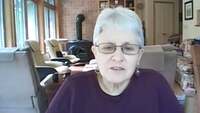 Interview with Jane Land
Interview with Jane Land Jane Land describes her childhood in Bucks County, her experiences at Moravian College in a social work program, and her movement to Northampton Community College to study mechanics where she was the only woman in the auto mechanic program. Land goes on to discuss her work as an auto mechanic at a variety of shops until she took a job at PPL in their garage and eventually as parts manager. With reference to her work, she discusses sexism and homophobia in the workplace and her work on gay and lesbian rights for employees of PPL. Beyond her discussion of her career, Land describes LGBT community spaces in the 1970s and 1980s, her work with N.O.W. in the 1970s (including attending the 1977 International Women’s Conference in Texas) and AIDS Outreach, and her religious affiliations with Quakers and UUC. Toward the end of the interview, Land discusses marriage equality and her spouse, Michele Strohl.
-
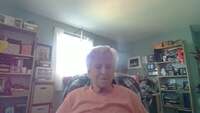 Interview with DJ Landis
Interview with DJ Landis DJ Landis discusses early childhood and young adulthood in Shamokin, PA, her thoughts about being adopted, and her family life. DJ addresses a number of gay bars in small towns and cities as well as LGBT social scene and butch/femme identities. The interview also addresses her work life at Pace Arrow, the challenges facing LGBT couples prior to marriage equality, and two serious relationships in her life. In reference to LGBT organizations, DJ discusses Pride of the Lehigh Valley, GLORA, Kindred Spirits, and MCCLV. DJ ends the interview with a discussion of her marriage to Sandy at a Unitarian Church.
-
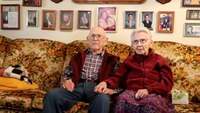 Interview with Roberta & Harold Kreider
Interview with Roberta & Harold Kreider Roberta & Harold discuss their lives as advocates for the LGBT community.
-
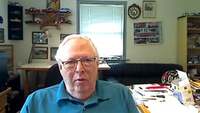 Interview with Don Kohn
Interview with Don Kohn Don Kohn discusses his leadership and Melinda Kohn’s leadership in PFLAG and the activities of PLAG in the Lehigh Valley. He also discusses PFLAG’s relationships with other LGBT organizations in the Valley and other regions in PA. The oral history includes a moving discussion of how he came to be a strong ally to LGBTQ communities through a discussion of his daughter’s coming out story and his desire to show his support for her. Finally, the oral history reflects upon the value of organizations like PFLAG and the changing political and social climate in the Lehigh Valley from the early years of his activism into the 21st century.
-
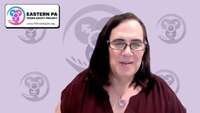 Interview with Corinne Goodwin
Interview with Corinne Goodwin Corinne Goodwin describes her childhood in Yonkers, Long Island, White Plains, NY, and Glen Falls; she focuses on her experiences as a transgender girl and the transphobia within her family. For example, she shares how her mother responded when she found feminine clothing in her room by exclaiming that it would “kill” her father if he found out. Corinne describes hiding her transgender identity from family after these formative experiences even as she continued to express her femininity in secret. Upon entering Eisenhower College, Corinne continued to be closeted, but developed important life-long friendships and met her future wife, Deb. When they married one year after college, Corinne discusses remaining in the closet even as she had “girl” days in which she was able to express her full self. In 1987, when she and Deb found out that Deb was pregnant, Corinne came out to her wife. The spouses developed routines in which Corinne could be her “real” self when Deb and her son visited relatives. Corrine also discusses her work life. She describes her 23-year career with Radio Shack, managing hundreds of stores within eastern PA; her work as Vice-President of Sales for Vonage; and her development of her own consulting business and then training and development business. Once she left the corporate world and started her own businesses, Corine describes coming out fully between 2008-2014 to everyone in her life, including her clients and living full time as her real self. She describes different parts of her transition, including social, legal, and medical transition. In other parts of the interview, Corinne discusses the import of support groups, like Renaissance, and how she developed the Eastern PA Trans Equity Project with other community members as well as their major work in our communities.
-
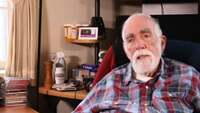 Interview with Joseph Burns
Interview with Joseph Burns Joseph Burns discusses his life as an LGBT individual and how he came to be involved in LGBT activism.
-
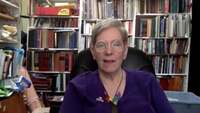 Interview with Liz Bradbury
Interview with Liz Bradbury Liz Bradbury opens the interview with a discussion of organizing to support the amendment of the Allentown anti-discrimination ordinance to include LGBTQ people as a protected class with PA-GALA and Felix Molina in the 1990s. She discuss using Voters’ Guides to document support or lack of support for the ordinance and lobbing for the ordinance with local politicians, city council hopefuls, and city council members. She also describes starting the Valley Gay Press during this period. The activist work of Felix Molina on behalf of the ordinance and to start the Puerto Rican Day parade is described in detail. As momentum grew to pass amendments to the ordinance, Liz discusses working with Mara Kiesling to write the revised text, which importantly included gender identity and was ultimately used to change the ordinance in 2002. The interview provides lots of details about City Council politics and races in Allentown, opposition to the ordinance (by figures like Frank McVeigh), and names of a number of key organizers who made the amendments possible. The interview also discusses the aftermath of the inclusion of LGBTQ people in the ordinance, including attention from national anti-LGBTQ organizations and failed organizing by anti-LGBTQ Allentown residents to remove protections for LGBTQ people.
-
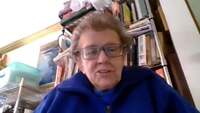 Interview with Nadine Anderson
Interview with Nadine Anderson Nadine Anderson discusses her life as an LGBT individual and how she came to be involved in LGBT activism.
 Interview with Bob Wittman Bob Wittman discusses his life as an LGBT individual and how he came to be involved in LGBT activism.
Interview with Bob Wittman Bob Wittman discusses his life as an LGBT individual and how he came to be involved in LGBT activism. Interview with Frank Whelan Frank Whelan discusses his life as an LGBT individual and how he came to be involved in LGBT activism.
Interview with Frank Whelan Frank Whelan discusses his life as an LGBT individual and how he came to be involved in LGBT activism. Interview with Patricia Sullivan Patricia Sullivan discusses her life as an LGBT individual and how she came to be involved in LGBT activism.
Interview with Patricia Sullivan Patricia Sullivan discusses her life as an LGBT individual and how she came to be involved in LGBT activism. Interview with Michele Strohl Michele Strohl describes her childhood in Northeastern PA with a focus on family life, discussion of normative understandings of gender, and her school experiences. Strohl describes college life at East Stroudsburg University, the lesbian community at college, and her first jobs as a mental health worker in Wilkes-Barre and then Allentown. Strohl goes on to explore getting a graduate degree in Psychology and her work in this field. In terms of the LGBT community, Strohl discusses a variety of organizations, including PA-GALA, AIDS Outreach, Gay and Lesbian Task Force, GLORA, and GLOS. She also provides information about local LGBT bars and nightlife as well as moving accounts of the early years of the AIDS epidemic and the impact of marriage equality on her personally. Finally, she discusses her marriage to Jane Land with details about their marriage ceremony and life together.
Interview with Michele Strohl Michele Strohl describes her childhood in Northeastern PA with a focus on family life, discussion of normative understandings of gender, and her school experiences. Strohl describes college life at East Stroudsburg University, the lesbian community at college, and her first jobs as a mental health worker in Wilkes-Barre and then Allentown. Strohl goes on to explore getting a graduate degree in Psychology and her work in this field. In terms of the LGBT community, Strohl discusses a variety of organizations, including PA-GALA, AIDS Outreach, Gay and Lesbian Task Force, GLORA, and GLOS. She also provides information about local LGBT bars and nightlife as well as moving accounts of the early years of the AIDS epidemic and the impact of marriage equality on her personally. Finally, she discusses her marriage to Jane Land with details about their marriage ceremony and life together. Interview with Sandy Mesics Sandy Mesics describes her childhood, growing up in Bethlehem, PA; her reflections on Bethlehem Steel, including her father’s employment with the company and working-class steel communities; and her experiences as young transwoman trying to find information in tabloids and books about other transgender people. She discusses her enrollment at Penn State as a physics and later a psychology major; her anti-Vietnam war activism; her gender dysphoria during college; and her journey toward gender affirmation with support from the Erickson Foundation and a doctor in Philadelphia. Moving to Philadelphia after college because of the large LGBTQ community, Sandy started Image Magazine, worked with Transsexual Action Committee, the Radical Queens, and Eromin Center; in addition, she built a relationship with publishers of Female impersonator Magazine and ultimately worked with publishers to produce articles and publications for transgender readers, beginning 1974-1975. Sandy then describes using her work in publishing to gain employment with W.B. Saunders, a graphic arts company, and as an html coder. Toward the end of the interview, Sandy describes living in Miami, training to be a nurse, becoming a nurse midwife, and meeting her wife. The interview concludes with Sandy’s discussion of moving back to Bethlehem to care for her mother and finding a job at St. Luke’s, training others in maternal-newborn nursing.
Interview with Sandy Mesics Sandy Mesics describes her childhood, growing up in Bethlehem, PA; her reflections on Bethlehem Steel, including her father’s employment with the company and working-class steel communities; and her experiences as young transwoman trying to find information in tabloids and books about other transgender people. She discusses her enrollment at Penn State as a physics and later a psychology major; her anti-Vietnam war activism; her gender dysphoria during college; and her journey toward gender affirmation with support from the Erickson Foundation and a doctor in Philadelphia. Moving to Philadelphia after college because of the large LGBTQ community, Sandy started Image Magazine, worked with Transsexual Action Committee, the Radical Queens, and Eromin Center; in addition, she built a relationship with publishers of Female impersonator Magazine and ultimately worked with publishers to produce articles and publications for transgender readers, beginning 1974-1975. Sandy then describes using her work in publishing to gain employment with W.B. Saunders, a graphic arts company, and as an html coder. Toward the end of the interview, Sandy describes living in Miami, training to be a nurse, becoming a nurse midwife, and meeting her wife. The interview concludes with Sandy’s discussion of moving back to Bethlehem to care for her mother and finding a job at St. Luke’s, training others in maternal-newborn nursing. Interview with Jane Land Jane Land describes her childhood in Bucks County, her experiences at Moravian College in a social work program, and her movement to Northampton Community College to study mechanics where she was the only woman in the auto mechanic program. Land goes on to discuss her work as an auto mechanic at a variety of shops until she took a job at PPL in their garage and eventually as parts manager. With reference to her work, she discusses sexism and homophobia in the workplace and her work on gay and lesbian rights for employees of PPL. Beyond her discussion of her career, Land describes LGBT community spaces in the 1970s and 1980s, her work with N.O.W. in the 1970s (including attending the 1977 International Women’s Conference in Texas) and AIDS Outreach, and her religious affiliations with Quakers and UUC. Toward the end of the interview, Land discusses marriage equality and her spouse, Michele Strohl.
Interview with Jane Land Jane Land describes her childhood in Bucks County, her experiences at Moravian College in a social work program, and her movement to Northampton Community College to study mechanics where she was the only woman in the auto mechanic program. Land goes on to discuss her work as an auto mechanic at a variety of shops until she took a job at PPL in their garage and eventually as parts manager. With reference to her work, she discusses sexism and homophobia in the workplace and her work on gay and lesbian rights for employees of PPL. Beyond her discussion of her career, Land describes LGBT community spaces in the 1970s and 1980s, her work with N.O.W. in the 1970s (including attending the 1977 International Women’s Conference in Texas) and AIDS Outreach, and her religious affiliations with Quakers and UUC. Toward the end of the interview, Land discusses marriage equality and her spouse, Michele Strohl. Interview with DJ Landis DJ Landis discusses early childhood and young adulthood in Shamokin, PA, her thoughts about being adopted, and her family life. DJ addresses a number of gay bars in small towns and cities as well as LGBT social scene and butch/femme identities. The interview also addresses her work life at Pace Arrow, the challenges facing LGBT couples prior to marriage equality, and two serious relationships in her life. In reference to LGBT organizations, DJ discusses Pride of the Lehigh Valley, GLORA, Kindred Spirits, and MCCLV. DJ ends the interview with a discussion of her marriage to Sandy at a Unitarian Church.
Interview with DJ Landis DJ Landis discusses early childhood and young adulthood in Shamokin, PA, her thoughts about being adopted, and her family life. DJ addresses a number of gay bars in small towns and cities as well as LGBT social scene and butch/femme identities. The interview also addresses her work life at Pace Arrow, the challenges facing LGBT couples prior to marriage equality, and two serious relationships in her life. In reference to LGBT organizations, DJ discusses Pride of the Lehigh Valley, GLORA, Kindred Spirits, and MCCLV. DJ ends the interview with a discussion of her marriage to Sandy at a Unitarian Church. Interview with Roberta & Harold Kreider Roberta & Harold discuss their lives as advocates for the LGBT community.
Interview with Roberta & Harold Kreider Roberta & Harold discuss their lives as advocates for the LGBT community. Interview with Don Kohn Don Kohn discusses his leadership and Melinda Kohn’s leadership in PFLAG and the activities of PLAG in the Lehigh Valley. He also discusses PFLAG’s relationships with other LGBT organizations in the Valley and other regions in PA. The oral history includes a moving discussion of how he came to be a strong ally to LGBTQ communities through a discussion of his daughter’s coming out story and his desire to show his support for her. Finally, the oral history reflects upon the value of organizations like PFLAG and the changing political and social climate in the Lehigh Valley from the early years of his activism into the 21st century.
Interview with Don Kohn Don Kohn discusses his leadership and Melinda Kohn’s leadership in PFLAG and the activities of PLAG in the Lehigh Valley. He also discusses PFLAG’s relationships with other LGBT organizations in the Valley and other regions in PA. The oral history includes a moving discussion of how he came to be a strong ally to LGBTQ communities through a discussion of his daughter’s coming out story and his desire to show his support for her. Finally, the oral history reflects upon the value of organizations like PFLAG and the changing political and social climate in the Lehigh Valley from the early years of his activism into the 21st century. Interview with Corinne Goodwin Corinne Goodwin describes her childhood in Yonkers, Long Island, White Plains, NY, and Glen Falls; she focuses on her experiences as a transgender girl and the transphobia within her family. For example, she shares how her mother responded when she found feminine clothing in her room by exclaiming that it would “kill” her father if he found out. Corinne describes hiding her transgender identity from family after these formative experiences even as she continued to express her femininity in secret. Upon entering Eisenhower College, Corinne continued to be closeted, but developed important life-long friendships and met her future wife, Deb. When they married one year after college, Corinne discusses remaining in the closet even as she had “girl” days in which she was able to express her full self. In 1987, when she and Deb found out that Deb was pregnant, Corinne came out to her wife. The spouses developed routines in which Corinne could be her “real” self when Deb and her son visited relatives. Corrine also discusses her work life. She describes her 23-year career with Radio Shack, managing hundreds of stores within eastern PA; her work as Vice-President of Sales for Vonage; and her development of her own consulting business and then training and development business. Once she left the corporate world and started her own businesses, Corine describes coming out fully between 2008-2014 to everyone in her life, including her clients and living full time as her real self. She describes different parts of her transition, including social, legal, and medical transition. In other parts of the interview, Corinne discusses the import of support groups, like Renaissance, and how she developed the Eastern PA Trans Equity Project with other community members as well as their major work in our communities.
Interview with Corinne Goodwin Corinne Goodwin describes her childhood in Yonkers, Long Island, White Plains, NY, and Glen Falls; she focuses on her experiences as a transgender girl and the transphobia within her family. For example, she shares how her mother responded when she found feminine clothing in her room by exclaiming that it would “kill” her father if he found out. Corinne describes hiding her transgender identity from family after these formative experiences even as she continued to express her femininity in secret. Upon entering Eisenhower College, Corinne continued to be closeted, but developed important life-long friendships and met her future wife, Deb. When they married one year after college, Corinne discusses remaining in the closet even as she had “girl” days in which she was able to express her full self. In 1987, when she and Deb found out that Deb was pregnant, Corinne came out to her wife. The spouses developed routines in which Corinne could be her “real” self when Deb and her son visited relatives. Corrine also discusses her work life. She describes her 23-year career with Radio Shack, managing hundreds of stores within eastern PA; her work as Vice-President of Sales for Vonage; and her development of her own consulting business and then training and development business. Once she left the corporate world and started her own businesses, Corine describes coming out fully between 2008-2014 to everyone in her life, including her clients and living full time as her real self. She describes different parts of her transition, including social, legal, and medical transition. In other parts of the interview, Corinne discusses the import of support groups, like Renaissance, and how she developed the Eastern PA Trans Equity Project with other community members as well as their major work in our communities. Interview with Joseph Burns Joseph Burns discusses his life as an LGBT individual and how he came to be involved in LGBT activism.
Interview with Joseph Burns Joseph Burns discusses his life as an LGBT individual and how he came to be involved in LGBT activism. Interview with Liz Bradbury Liz Bradbury opens the interview with a discussion of organizing to support the amendment of the Allentown anti-discrimination ordinance to include LGBTQ people as a protected class with PA-GALA and Felix Molina in the 1990s. She discuss using Voters’ Guides to document support or lack of support for the ordinance and lobbing for the ordinance with local politicians, city council hopefuls, and city council members. She also describes starting the Valley Gay Press during this period. The activist work of Felix Molina on behalf of the ordinance and to start the Puerto Rican Day parade is described in detail. As momentum grew to pass amendments to the ordinance, Liz discusses working with Mara Kiesling to write the revised text, which importantly included gender identity and was ultimately used to change the ordinance in 2002. The interview provides lots of details about City Council politics and races in Allentown, opposition to the ordinance (by figures like Frank McVeigh), and names of a number of key organizers who made the amendments possible. The interview also discusses the aftermath of the inclusion of LGBTQ people in the ordinance, including attention from national anti-LGBTQ organizations and failed organizing by anti-LGBTQ Allentown residents to remove protections for LGBTQ people.
Interview with Liz Bradbury Liz Bradbury opens the interview with a discussion of organizing to support the amendment of the Allentown anti-discrimination ordinance to include LGBTQ people as a protected class with PA-GALA and Felix Molina in the 1990s. She discuss using Voters’ Guides to document support or lack of support for the ordinance and lobbing for the ordinance with local politicians, city council hopefuls, and city council members. She also describes starting the Valley Gay Press during this period. The activist work of Felix Molina on behalf of the ordinance and to start the Puerto Rican Day parade is described in detail. As momentum grew to pass amendments to the ordinance, Liz discusses working with Mara Kiesling to write the revised text, which importantly included gender identity and was ultimately used to change the ordinance in 2002. The interview provides lots of details about City Council politics and races in Allentown, opposition to the ordinance (by figures like Frank McVeigh), and names of a number of key organizers who made the amendments possible. The interview also discusses the aftermath of the inclusion of LGBTQ people in the ordinance, including attention from national anti-LGBTQ organizations and failed organizing by anti-LGBTQ Allentown residents to remove protections for LGBTQ people. Interview with Nadine Anderson Nadine Anderson discusses her life as an LGBT individual and how she came to be involved in LGBT activism.
Interview with Nadine Anderson Nadine Anderson discusses her life as an LGBT individual and how she came to be involved in LGBT activism.